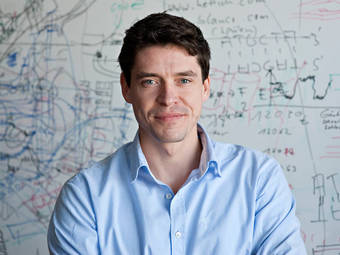Biophysicist Hendrik Dietz (36) awarded top German research award
Fourth Leibniz prizewinner in the TUM Physics Department
2014-12-10 – News from the Physik-Department

TUM President Professor Wolfgang Herrmann, who nominated the young prizewinner, welcomed the news: “With Hendrik Dietz, we now have four Leibniz prizewinners in the TUM Physics Department. This confirms our status as a top research university and is a glowing endorsement of our new appointments and career system.”
Dietz has been professor of physics at the TUM since 2009. The university recently managed to keep him in Garching, despite an attractive offer from Delft University of Technology (Netherlands). He is also a Hans Fischer Fellow of the TUM INSTITUTE FOR ADVANCED STUDY (IAS), the elite interdisciplinary institute established on the basis of the Excellence Initiative 2006. Since taking up his position at the TUM, Dietz has been awarded one of the European Union’s highly coveted ERC Starting Grants and the Arnold Sommerfeld Prize of the Bavarian Academy of Sciences and Humanities.
The human cell mostly consists of large complex molecules like DNA and proteins, which are self-organizing. The associated information is contained in their sequence – for example, in the base sequence – and in their three-dimensional structure. In his research, Dietz focuses on the question as to how nature’s principle of programmable structure formation can be exploited for technological purposes.
Dietz and his team use DNA as a building material, which is folded in a special way using a kind of “DNA origami” and thereby converted into three-dimensional structures. They have developed methods that enable the very fast and accurate implementation of this process. The development of a synthetic channel for lipid membranes is one example which illustrates the potential offered by this research. This channel could enable the programmed perforation of cells or bacteria and be further developed for the targeted localization of biologically active molecules in the cell interior.
A particularly outstanding aspect of Professor Dietz’s research is its interdisciplinarity (biomolecular physics, biochemistry, molecular medicine). It is fully integrated into the Munich Cluster Projects being carried out as part of the Excellence Initiative.
The TUM has a total of 17 Leibniz prizewinners among its ranks, four of whom are in the Physics Department (Prof. Dr. Gerhard Abstreiter, Prof. Dr. Martin Beneke, Prof. Dr. Franz Pfeiffer, Prof. Dr. Hendrik Dietz).
Further information
Contact
- Prof. Dr. Hendrik Dietz
- Biomolekulare NanotechnologiePhysik-Department und Walter Schottky Institut / ZNNTechnische Universität MünchenAm Coulombwall 4a85748 GarchingTel.: +49 89 289-11615E-Mail: dietz@tum.de